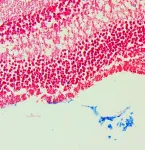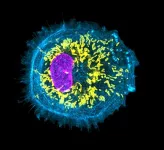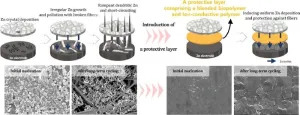(Press-News.org) Bottom Line: Over 10% of fecal immunochemical tests (FIT) used for routine colorectal cancer (CRC) screening in a safety-net health system contained unsatisfactory samples that could not be processed.
Journal in Which the Study was Published: Cancer Epidemiology, Biomarkers & Prevention, a journal of the American Association for Cancer Research (AACR)
Authors: Rasmi Nair, MBBS, PhD, an assistant professor at the Peter O’Donnell Jr. School of Public Health of UT Southwestern Medical Center, and Po-Hong Liu, MD, a gastroenterology fellow at UT Southwestern Medical Center
Background: FIT is a self-collected test that looks for hidden blood in the stool and is recommended by the US Preventive Services Task Force for annual CRC screening among individuals aged 45 to 75. For many—including uninsured and lower-income individuals, as well as those from medically underrepresented groups—FIT may be cheaper and more accessible than a colonoscopy or other stool-based tests that look for potentially tumorigenic DNA.
“FIT is the test of choice, particularly in large population-based settings where access to screening colonoscopy is limited,” Nair said. “Even when colonoscopy is available, many would prefer to do the simple, noninvasive stool test.”
While previous studies have examined how to increase FIT participation, few have investigated how often screening is completed unsuccessfully due to problems with sample collection, labeling, or storage, said co-first author Po-Hong Liu, MD, a gastroenterology fellow at UT Southwestern Medical Center. Further, it is unclear to what extent patients who submit unsatisfactory samples receive follow-up testing.
“The effectiveness of FIT depends on the satisfactory completion of multiple steps—participation, test completion, follow-up of abnormal results, and repeat testing annually,” Liu explained. “A break in the chain at any point can reduce the effectiveness of CRC screening.”
How the Study was Conducted: Nair, Liu, and colleagues examined the history of 56,980 individuals aged 50 to 74 who underwent FIT screening between 2010 and 2019 within the Dallas-based Parkland Health system, a safety-net health system that primarily provides care to uninsured, lower-income, and racial/ethnic minority individuals. The tests were performed at health care offices or via a mail order system, the latter of which automatically sent a repeat test to individuals with an initial unsatisfactory result.
Results: Overall, 10.2% of tests were found to be unsatisfactory; the testing laboratories recorded the reasons as inadequate specimen (51%), incomplete labeling (27%), sample too old (13%), or a broken or leaking container (8%). Only 40.7% of individuals with unsatisfactory tests received follow-up FIT or colonoscopy screening within 15 months of the failed test.
“The fact that, in most instances, unsatisfactory FIT was not followed by a timely subsequent test highlights the need for systems to have a better, more comprehensive approach to tagging and following up unsatisfactory FIT,” Liu said.
Mail order tests were 2.66 times more likely to produce unsatisfactory results than tests performed in a clinic, which the authors speculated may reflect the technical assistance available in a clinic. However, likely due to the automatic distribution of a repeat test, patients with unsatisfactory mail order tests were 1.92 times more likely to undergo repeat screening within 15 months.
The study also found racial and ethnic disparities in satisfactory FIT completion: Black patients were 1.46 times more likely to submit an unsatisfactory test, and patients who primarily speak Spanish were 1.12 times more likely to submit an unsatisfactory test.
Author’s Comments: This study highlights the importance of minimizing language, literacy, and logistical barriers to successful test completion, as well as the need for a comprehensive system to identify unsatisfactory tests and flag them for follow-up, Nair explained.
Based on these data and those from previous studies, the authors suggested several potential solutions to improve complete and accurate sampling. These included wordless or low-literacy instruction pamphlets to eliminate language and literacy barriers; pre-affixed patient labels or barcodes to minimize labeling errors; and automated systems for identifying and contacting patients with unsatisfactory tests.
Study Limitations: Limitations of this study include its potentially limited applicability to safety-net systems, its reliance on the laboratory’s often brief notes about reasons underlying unsatisfactory tests, and the possibility of patients receiving follow-up care outside the Parkland Health system. Further, because the window for successful repeat testing was longer than 12 months, some of those tests may have been subsequent annual screening rather than repeat tests.
Funding & Disclosures: Funding for this study was provided by the National Institutes of Health and the Cancer Prevention and Research Institute of Texas. Nair and Liu report no conflicts of interest.
END
More than 10% of samples from a stool-based colorectal cancer test may be unsatisfactory
Fewer than half of patients with unsatisfactory samples from fecal immunochemical tests completed follow-up testing within 15 months
2023-11-15
ELSE PRESS RELEASES FROM THIS DATE:
Underworld marketplace exposed: Fake IDs for sale on the dark web
2023-11-15
Counterfeit Australian identity documents, especially driver’s licences, rank among some of the most frequently listed and sold identity documents on anonymous dark web marketplaces, according to new research from the Centre of Forensic Science at the University of Technology Sydney (UTS).
These documents are used by crime rings, terrorist organisations and other criminals for a wide range of illicit activities, including identity crime, money laundering, human and drug trafficking, illegal immigration, scams and ...
Shark fear: Just when you thought it was safe to get back in the water…
2023-11-15
It’s one of the most famous taglines in film history, immortalising sharks as ruthless predators. But beyond the horror generated by Spielberg’s Jaws series, a persistent fear of sharks remains, with consequences that extend into reality.
Following human-shark interactions in South Australia, this fear has prompted the Education Department’s ban on school-based sea activities for at least the remainder of the term. And while safety is at the core of such decisions, we should be cautious of scaremongering, says UniSA shark ...
The role of iron in blindness caused by ocular toxoplasmosis
2023-11-15
Researchers from Nagoya University Graduate School of Medicine have identified the role of iron in ocular toxoplasmosis (OT), a form of toxoplasmosis that causes blindness. They found reduced iron concentration in the clear gel part of the eye of human patients and iron accumulation in the retina of mice. Treatment of mice with a compound that decreases iron was successful in reducing their symptoms. Their findings show the important role of iron in the disease and that controlling it may lead to a successful treatment. Their ...
New study reveals the critical role of microglia in human brain development
2023-11-15
An international team of scientists has uncovered the vital role of microglia, the immune cells in the brain that acts as its dedicated defense team, in early human brain development. By incorporating microglia into lab-grown brain organoids, scientists were able mimic the complex environment within the developing human brain to understand how microglia influence brain cell growth and development. This research represents a significant leap forward in the development of human brain organoids and has the potential to significantly impact ...
Sex differs in intestinal MCT1 function
2023-11-15
Monocarboxylate transporter 1 (MCT1) plays a crucial role in the transport of lactate, pyruvate, ketone bodies, and short-chain fatty acids (SCFA), as well as MCT1-targeted drugs in various tissues. How MCT1 and lactate in the intestine modulate the physiology and pathophysiology of the body is unclear. A recent study published in Life Metabolism reveals that intestinal MCT1 regulates intestinal inflammation and metabolism in a sex-dimorphic pattern, which further confirms that metabolic homeostasis is ...
National Climate Assessment reporting continues at AGU23 in San Francisco
2023-11-15
WASHINGTON — AGU congratulates the many members of our scientific community whose work contributed to the Fifth National Climate Assessment (NCA5), which was published today.
Climate reporting will remain essential as we close out a year of record global temperatures, wildfires in Canada, Hawaii and the U.S. Southeast, droughts in the Amazon and Mississippi river basins, and billion-dollar flooding disasters in the U.S Northeast and California, aggravated by human-driven climate change.
AGU’s upcoming 2023 Annual Meeting, convening 11-15 December, will host authors from each of the NCA’s 32 chapters and feature deep ...
Using cosmetic ingredient for battery protection
2023-11-15
Xanthan gum, derived from plants like cabbage and known for its carbohydrate content, serves as a natural protective barrier in cosmetics to retain their benefits on the skin. In a recent development, this remarkable substance has been harnessed to create a protective shield for battery electrodes, rather than for the skin.
Professor Changshin Jo from the Graduate Institute of Ferrous & Eco Materials Technology and the Department of Chemical Engineering and Jooyoung Jang, a PhD candidate, from the Department of Chemical Engineering at Pohang University of Science and Technology (POSTECH), have crafted a protective film by blending ...
SFI Press releases new editions of Murray Gell-Mann books
2023-11-15
The opening lines of Homer’s Odyssey describe its eponymous hero as polytropos, a man of many turns. It’s no coincidence that SFI co-founder Murray Gell-Mann invoked Homer’s crafty, long-voyaging hero when he envisioned the pinnacle of the scientific endeavor.
“Murray described his ideal scientist as an ‘Odyssean,’ one who lives somewhere between the analytical Apollonian and the intuitive Dionysian, one who loves to simplify yet is equally enamored of complication,” says David Krakauer, SFI President and Editor-in-Chief of the SFI Press. “Over the course of Murray’s life, he realized this ideal in his own ...
THE LANCET: Alarming new projections reveal soaring health risks of persistent global inaction over the climate emergency
2023-11-15
Peer-reviewed / Review and Analysis / People
The Lancet: Alarming new projections reveal soaring health risks of persistent global inaction over the climate emergency
New global projections in the 8th annual report of the Lancet Countdown on Health and Climate Change reveal the grave and mounting threat to health of further delayed action on climate change, with the world likely to experience a 4.7-fold increase in heat-related deaths by mid-century.
Report also highlights how climate inaction is costing lives and livelihoods today. In 2022, individuals were, on average, exposed to 86 days of health-threatening ...
COVID-19 showed the importance of genomic surveillance – now we need it to help fight antimicrobial resistance, say researchers
2023-11-15
During the COVID-19 pandemic, genomic surveillance proved vital in helping understand the evolution and spread of the SARS-CoV-2 virus. Now, an international group of researchers is calling for its potential to be harnessed to tackle antimicrobial resistance (AMR), a major global challenge that could ultimately result in many more deaths than the coronavirus pandemic.
AMR already causes substantial sickness and death worldwide, responsible for approximately 1.27 million deaths in 2019. Some estimates suggest that by 2050, it could kill as many as 10 million people each year.
Professor Sharon Peacock at the University ...
LAST 30 PRESS RELEASES:
Study reveals how chills develop and support the body's defense against infection
Half of the world’s coral reefs suffered major bleaching during the 2014–2017 global heatwave
AI stethoscope can help spot ‘silent epidemic’ of heart valve disease earlier than GPs, study suggests
Researchers rebuild microscopic circadian clock that can control genes
Controlled “oxidative spark”: a surprising ally in brain repair
Football-sized fossil creature may have been one of the first land animals to eat its veggies
Study finds mindfulness enables more effective endoscopies in awake patients
Young scientists from across the UK shortlisted for largest unrestricted science prize
Bison hunters abandoned long-used site 1,100 years ago to adapt to changing climate
Parents of children with medical complexity report major challenges with at-home medical devices
The nonlinear Hall effect induced by electrochemical intercalation in MoS2 thin flake devices
Moving beyond money to measure the true value of Earth science information
Engineered moths could replace mice in research into “one of the biggest threats to human health”
Can medical AI lie? Large study maps how LLMs handle health misinformation
The Lancet: People with obesity at 70% higher risk of serious infection with one in ten infectious disease deaths globally potentially linked to obesity, study suggests
Obesity linked to one in 10 infection deaths globally
Legalization of cannabis + retail sales linked to rise in its use and co-use of tobacco
Porpoises ‘buzz’ less when boats are nearby
When heat flows backwards: A neat solution for hydrodynamic heat transport
Firearm injury survivors face long-term health challenges
Columbia Engineering announces new program: Master of Science in Artificial Intelligence
Global collaboration launches streamlined-access to Shank3 cKO research model
Can the digital economy save our lungs and the planet?
Researchers use machine learning to design next generation cooling fluids for electronics and energy systems
Scientists propose new framework to track and manage hidden risks of industrial chemicals across their life cycle
Physicians are not providers: New ACP paper says names in health care have ethical significance
Breakthrough University of Cincinnati study sheds light on survival of new neurons in adult brain
UW researchers use satellite data to quantify methane loss in the stratosphere
Climate change could halve areas suitable for cattle, sheep and goat farming by 2100
Building blocks of life discovered in Bennu asteroid rewrite origin story
[Press-News.org] More than 10% of samples from a stool-based colorectal cancer test may be unsatisfactoryFewer than half of patients with unsatisfactory samples from fecal immunochemical tests completed follow-up testing within 15 months






